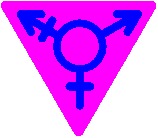Book Review: I Am My Own Woman


The following article originally appeared in
The Monarch: Canada's Transgender Reader Winter 1997 Issue # 44.
The Monarch is the quarterly publication for
the southern-Ontario transgender group,
Xpressions.

Mahlsdorf, Charlotte von. 1995. I Am My Own Woman: The Outlaw Life of Charlotte von Mahlsdorf, Berlin's Most Distinguished Transvestite. Translated by Jean Hollander. 179 pp.
There are times when I think that being transgendered is hard. The fear of being discovered and socially scorned always hovers in the back of my mind, like some giant raincloud. For reassurance, I often remind myself that I'm not living in Nazi Germany. This is Toronto, in 1997. Things aren't that bad.
But how bad was Nazi Germany for transgendered folk? How did transpeople survive there? It was with such questions on my mind that I read the autobiography of Charlotte von Mahlsdorf, I Am My Own Woman. Charlotte von Mahlsdorf (born Lothar Berfelde), transvestite and antique collector, was born in 1928 and lived under two of the most oppressive governments in history: the Nazis and the East German Communists. "What was this person's life like?" I wondered.
Mahlsdorf's life is full of uncommon accomplishments. As a teen, she dressed in girl's clothing in Nazi Germany. After the war, she took it as her personal mission to save one of the city's old buildings which she slowly transformed into a museum for antique furniture from the Grunderzeit era. She was also involved in gay and lesbian liberation groups in Communist East Germany. And she never "came out" as a crossdresser, because she was never really "in".
Unfortunately, as interesting as von Mahlsdorf's circumstances were, I really can't say I enjoyed the book. Some of the events she describes are very vivid and menacing, like the time that she was almost shot by German soldiers for not arming herself to defend Berlin in the final days of the war. But somewhere in the catalogue of people and places with unfamiliar-sounding names, things started to blur together. For me, the book started to drift in the middle, shortly after the fall of the Nazis. While reading the latter half of the book, I found myself constantly flipping back and forth, trying to link names and events.
One of the things I did not expect from a biography of "Berlin's most distinguished transvestite" is how little consideration is given to her transvestitism. Throughout the book, Mahlsdorf quietly insisted on being who she was and, for the most part, did so without much protest from the people around her.
Unlike the biographies of Jan Morris or Tula, Mahlsdorf doesn't dwell on gender difference -- for her it suffices to say that she is a girl in the body of a boy. But not trapped in the body of a boy. As she says: "In my soul, I feel like a woman. That does not mean, however, that I am self-conscious about my male sexual organs. I am not a transsexual." She spends no time trying to figure out why she is. Instead, she quietly goes about living the life she wants. It's noteworthy that because Mahlsdorf doesn't see her own crossdressing as anything out of the ordinary, she doesn't let people use it against her. When the East German Stasi dropped in to tell her that she's "an undesirable person," she merely replied (with a curtsy): "It's a good thing that I know that now."
On one hand, Mahlsdorf's attitude is quite refreshing. Rather than tell the story of a transvestite trying, against the odds, to lead a normal life, I Am My Own Woman depicts Mahlsdorf as a normal person who just happens to be a transvestite.
But on the other hand, Mahlsdorf's easy-going attitude makes the book a little dry. She never seems to be truly involved in the events going on around her. She tells us what is happening, but seldom what she feels. For example, the only family member to raise any serious objection to her cross-dressing habits was her father, a cruel, short-tempered, and violent man. Near the end of World War II, when Mahlsdorf was just a teenager, she killed her father in an act of self defense and spent the last days of war in prison. I cannot imagine a moment like this without strong emotions, but Mahlsdorf merely catalogues a sequence of actions and a series of consequences, and, not surprisingly, a major moment in Mahlsdorf's life is rendered dull.
Back to my transgender reading list.